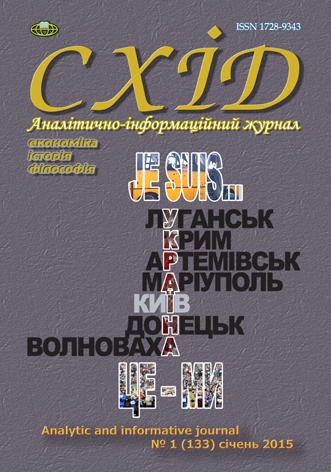Kiev budget potential structure optimization under decentralization policies
DOI:
https://doi.org/10.21847/1728-9343.2015.1(133).40049Keywords:
Kyiv budget potential, fiscal decentralization, area alternative potential budget structureAbstract
The article aims to develop a model Kyiv budget potential optimization under the new realities of fiscal decentralization in Ukraine. Analyzing, summarizing and systematizing regulations that were adopted in the context of local government reforms during 2012 and early 2015, considered and constructed criteria for the two scenarios Kyiv budget potential alternative structure and established relationships between them. The study had identified three initial positions, which should be considered during the restructuring of potential budget areas: fiscal opportunities available, limited budget costs and changing priorities of intergovernmental relations.
In the process of constructing a model Kyiv budget potential structure optimization found that innovation fiscal decentralization should strengthen the capacity of the tax component of the city budget by 15-20 percent compared to previous years. At the same time when modeling two scenarios of further development ("sustainable development" and "stability") real priorities of strengthening local financial base are precisely excise retailers who shall produce a tenth of the city budget total revenues. In addition, analysis income tax revenue share entities showed a robust dependence and may prevent the planned budget revenue for the city in terms of a significant deterioration in the economic situation. A more rational option would be consolidation of value added tax in the same proportion (3-5 percent) produced in Ukraine goods (works, services), which provides roughly the same potential revenues to the city budget, but they are much less dependent from short-term fluctuations in the economy.Downloads
References
Mamonova V., Lukin S., Molodozhen Y. et al. (2014), Prediction of areas. Budget forecasting, Kyiv, 200 p. (ukr).
Batkibekov S., Kadachnikov P., Lugovoy O. et al. (2000), Evaluation of the tax potential of the regions and the distribution of financial aid from the federal budget, Sovershenstvovaniye mezhbudzhetnykh otnosheniy, Moscow, pp. 83-237 (rus).
Law of Ukraine (2014), The State Budget 2015 and changes in legislation Ukraine to implement the CMU program "Restoration Ukraine", available at: https://www.google.com.ua/url?sa=t&rct=j&q=&esrc=s&sourc (ukr).
Law of Ukraine (2014), On Amendments to the Tax Code of Ukraine and some laws on tax reform № 71-VIII dated 28.12.2014, available at: http://zakon4.rada.gov.ua/laws/show/71-19/paran2#n2 (ukr).
Law of Ukraine (2014), On Amendments to the Budget Code of Ukraine and reform of intergovernmental relations № 79-VIII dated 12.28.2014, available at: http://zakon4.rada.gov.ua/laws/show/71-19/paran2#n2 (ukr).
Cabinet of Ministers of Ukraine (2014), On approval of the Concept of reforming local government and territorial authorities in Ukraine № 133-r dated 01.04.2014, available at: http://zakon2.rada.gov.ua/laws/show/333-2014-%D1%80 (ukr).
Volkovskyi Y. I. (2014), Kyiv city - state generator of revenue, Finansy, Oblik i Audyt, № 1 (23), 304 p. (ukr).
Musgrave R. A., Musgrave P. B. (1989), Public Finance in Theory and Practice, McGraw-Hill, New York (engl).
Downloads
Published
How to Cite
Issue
Section
License
Copyright (c) 2015 Yevgen Volkovskyi, Hanna Kotina, Maryna Stepura

This work is licensed under a Creative Commons Attribution-NonCommercial-NoDerivatives 4.0 International License.
1. Authors bear responsibility for the accuracy of facts, quotations, numbers and names used.
2. Manuscripts are not sent back.
3. The publisher does not always agree with the authors' opinion.
4. The authors reserve the right to authorship of the work and pass the first publication right of this work to the journal under the terms of a Creative Commons Attribution-NonCommercial-NoDerivatives 4.0 International License. This license allows others to distribute (copy) the published work for non-commercial purposes, provided there is mandatory attribution to its authors and a link to the first publication in our journal.
5. The authors have the right to conclude separate supplement agreements that relate to non-exclusive work distribution in the form in which it has been published by the journal (for example, to upload the work to the online storage of the journal or publish it as part of a monograph), provided that the reference to the first publication of the work in this journal is included.

